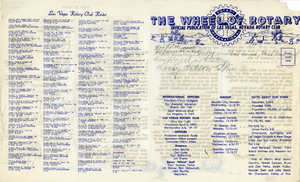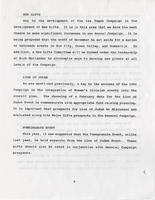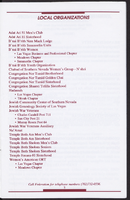Search the Special Collections and Archives Portal
Search Results

The Wheel of Rotary Las Vegas Rotary Club newsletter, December 29, 1949
Date
Archival Collection
Description
Text

Angela Castro oral history interview: transcript
Date
Archival Collection
Description
Oral history interview with Angela Castro conducted by Stefani Evans, Cecilia Winchell, Kristel Peralta, Vanessa Concepcion, and Ayrton Yamaguchi on November 05, 2020 for the Reflections: The Las Vegas Asian American and Pacific Islander Oral History Project. Castro begins the interview by talking about her early life, childhood, what Guam was like, and the history of her parents and grandparents. She describes the difference in public and private education in Guam and compares it to the United States. She explains the reason why she moved to Las Vegas, Nevada in 1998 and attended the University of Nevada, Las Vegas for public relations. Castro then talks about the differences between older and newer generations, the political atmosphere in Guam, and the differences between the United States and Guam in politics. She also talks about the discrimination she has experienced throughout her life and diversity in the workplace. Lastly, she describes her culture and traditions during holidays, the struggles with an absence of culture within her family, and her personal religious beliefs.
Text

Transcript of interview with Alice Thiriot Waite by Carole Terry and Donna Andress, October 19, 2011
Date
Archival Collection
Description
The memories and recollections of Alice Thiriot Ballard Waite provide a most interesting look at both at the Junior League of Las Vegas in the 1970s and the early days of Las Vegas. Alice recalls her childhood and young adult years after she arrived in Las Vegas at the age of five, giving the reader a rare picture of Las Vegas in the 1950s and 1960s. She was most active in the volunteer community of Las Vegas and served as Junior League President in 1964-5. Her reminiscences about the events and activities during the years while she was a Junior League member are an invaluable insight into its history. The exhibits she is sharing are an important documentation of those years after the Service League became the Junior League. She herself was a forerunner of today's Active members because she was a single, working mother while serving as the first "professional" President of the League.
Text

Transcript of interview with Don Laughlin by Stefani Evans and Claytee White, October 10, 2016
Date
Archival Collection
Description
Minnesotan Don Laughlin landed far from the land of (more than) 10,000 lakes. His office 90 miles south of Las Vegas in the eponymous town of Laughlin commands an unimpeded view of a very different landscape from that of his youth. Here, where the Colorado River flows south through one of its narrowest channels, Laughlin arrived in about 1966 and purchased what would become the Riverside Resort Hotel and Casino. The endeavor was so successful that the then-settlement of 10 to 15 people at that tiny spot on the river grew to be an unincorporated town housing more than 7,000 people in 2010. Today, Laughlin the man continues to promote and support Laughlin the town via flood control projects and infrastructure development. In this interview, Laughlin sits amid the antique slot machines in his office and enjoys the view as he recalls his childhood on the family farm in southern Minnesota, and talks about leaving the farm in the late 1940s for nearby Owatonna to do watchmaking and watch repairing while simultaneously running a slot machine and pinball parlor. After visiting Las Vegas on vacation, he arrived permanently in 1952 and bartended at the Thunderbird Hotel until he bought his own bar and restaurant in Downtown Las Vegas, which he named Laughlin’s Made Right Café. After selling the café, he bought the 101 Club in North Las Vegas. He began searching for a casino for a casino to buy, seeking only those located on the border of a state that did not allow gambling. When he found the small hotel/casino on the Colorado River he purchased it. He talks of building an airstrip across the street and making daily trips to Las Vegas to buy groceries, beer, and toilet paper-essentially, everything one would need to run a hotel, restaurant, and casino-sometimes making three trips in one day. He continues to own and manage his hotel/casino at the age of 85, and he is in his office every day, all day, seven days a week. He gave up flying last year because he claims he’s too old to pilot his own aircraft. So is especially advantageous that the town that bears his name can now supply almost everything that he and the Riverside Resort Hotel and Casino need.
Text

Transcript of interview with Don Ross by Barbara Tabach, February 15, 2017
Date
Archival Collection
Description
At the time of this interview, Don Ross has devoted nearly four inspirational decades of his life in the hotel and hospitality industry. In December 1987, at the age of 29, he accepted a position with Caesars and is now the Vice President of Catering, Conventions & Events for Caesars Palace Las Vegas. Don shares personal stories that lead to his “Don-mode” of providing a high level of customer service. From experiences with his grandparents to an extraordinary upbringing in his parents’ business, Green Chimneys, in Brewster, New York, Don received a surprisingly well-rounded educational foundation. As Don discovered his natural innate ability to serve others in the hospitality industry, he thrived and has never looked back. In recent years, his leadership talents and giving nature have been honored. In 2009, he was one of three distinguished industry executives recognized for their exceptional contributions to the hospitality industry as an “Industry Executive of the Year” during UNLV Harrah College of Hotel Administration’s 5th Annual Vallen Dinner of Distinction. Over the years, he has been honored for his work with Opportunity Village, his Jewish community involvement, and his continued work with Green Chimneys among many other organizations and causes.
Text

Transcript of interview with Roberta Kane by Barbara Tabach, September 6, 2017 and May 22, 2018
Date
Archival Collection
Description
Roberta “Bobbie” Kane (1932 - ) is the first known Jewish child born in Las Vegas. Her parents, Sallie and Mike Gordon, were liquor stores owners and among the founders of the first Jewish congregation in Las Vegas. Bobbie’s childhood remembrances are as a young girl who was fully aware that “Friday nights were reserved for religious services. Saturdays were always reserved for gin rummy.” In the late 1940s, as a teenager at Las Vegas High School (and 1950 graduate), Bobbie recalls Las Vegas as a small town and a joyful place to grow up. She briefly attended University of Southern California before marrying and beginning her family. In time, life brought her back to live with her parents. She pursued a career working for the Desert Inn group of hotels and helped open the Stardust in 1957. She was mentored by Mark Swain, “a six foot-four hunk of a cowboy” who worked for Moe Dalitz. This experience included driving Mark’s pink Cadillac to pick up hotel guests. This provided her with a
Text

Transcript of interview with Milton I. Schwartz by Claytee White, May 4, 2004
Date
Archival Collection
Description
In this interview, Milton Schwartz discusses his life in Las Vegas and his business investments. He worked at the Flamingo Hotel right after World War II, and he started Valley Hospital as an investor in 1970. Schwartz has a Hebrew academy named after him in Israel, and owned the Yellow-Checker-Star Cab Company. He was active in the Republican Party.
Milton I. Schwartz was born and raised in Brooklyn, New York. He enlisted in the Army the day after Pearl Harbor (age 20) and did a five year stint in the Pacific as a repeater specialist. After the war he returned to his job as a refrigeration mechanic in Brooklyn and was soon offered a job out in Las Vegas at the Flamingo Hotel, which was owned by Bugsy Siegel. After three months in Las Vegas, during which time he had several conversations over dinner with Beldon Cattleman, Milton returned to New York to work with his father in the fixture business. After ten years he sold that business and bought into Design Equipment Construction, which brought him back to Las Vegas. Milton started or bought many businesses over the years, but the one he's proudest of is Valley Hospital. He and his partners brought the first medical helicopters into Nevada and he feels that many lives were saved because of that. He also invested in Yellow-Checker-Star Cab Company, which he still owns. Two on-going concerns that are important to Milton are his involvement with the Republican Party and the Milton I. Schwartz Hebrew Academy in Israel. Of the many awards and plaques he has earned over the decades, he is proudest of the birthday acknowledgements from the Academy. He believes strongly that the most important achievements of his life revolve around his religion and the children being educated in it. Milton shares many stories, facts, descriptions, and anecdotes about Las Vegas in the decades since 1946. He built a house in the Scotch 80's, contributes to UNLV, and approves of city growth and the proposed changes in the downtown area. He has contributed much to the growth and stability of the Las Vegas valley.
Text

Transcript of interviews with Louis Wiener, Jr. by Eleanor Johnson, January-February, 1990
Date
Archival Collection
Description
In this multi-part interview, Louis Wiener, Jr. discusses coming to Las Vegas from Pittsburgh at a young age, attending Las Vegas High School and University of Nevada Reno. He attended law school at University of California at Berkeley and passed the Nevada State Bar in 1941. He established a practice, Jones, Wiener and Jones, with Bob Jones and Cliff Jones and later with Herb Jones. He had another practice with Neil Galatz and Dave Goldwater, retiring in 1988. Wiener had other business ventures that allowed him to do pro bono work as a lawyer. Wiener discusses his family, including former spouses, his children, and various aspects of his career as an attorney in Las Vegas, representing hotels in the Greenspun antitrust lawsuit, and as an attorney for Bugsy Siegel. He says of his success, "I'm just lucky. I was here at the right time and I picked the right people to help."
Text


